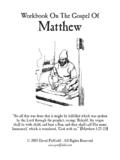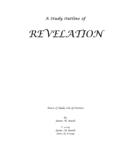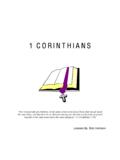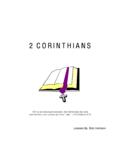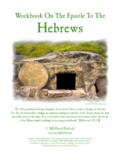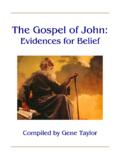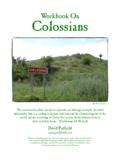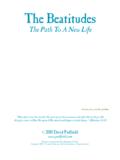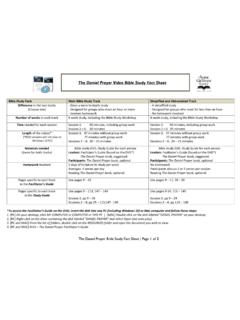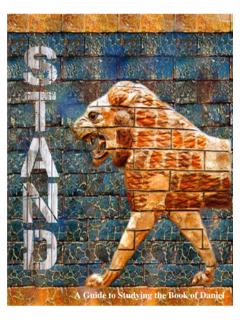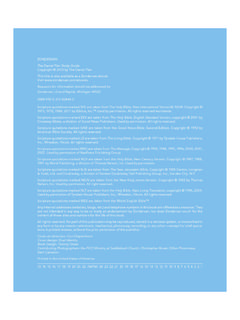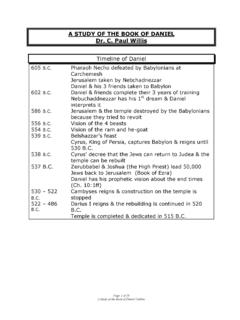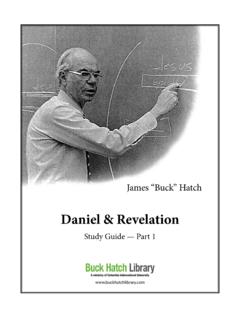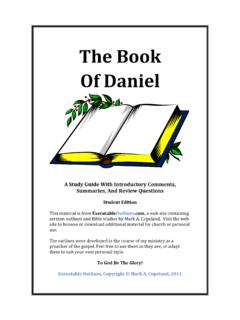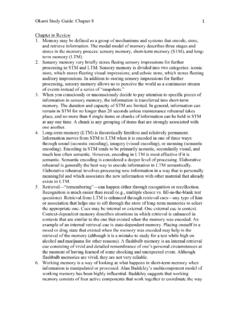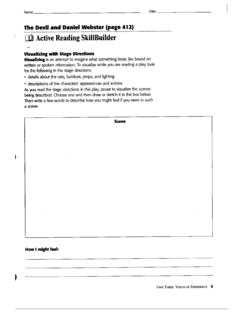Transcription of A Study of the Book of Daniel - padfield.com
1 A Study of the book of Daniel . Gene Taylor Preface The Study of any of the Old Testament prophets is a worthwhile endeavor. The book of Daniel is no exception for it provides a wealth of information to those who would diligently consider it and its teachings. While the book has some things in it which may be difficult to understand, at the same time it provides many principles, lessons and insights that must not be neglected. For example, if one is going to understand the book of Revelation, he must first understand Daniel 's writings. This Study guide has been prepared to help the student, either on his own or in a classroom setting, do just that.
2 Contained in this guide are: 1) Descriptive summaries of the Babylonian, Medo-Persian and Grecian Empires; 2) A general introduction to the book of Daniel ; 3) An outline of the book of Daniel ; 4). Summaries of every chapter of Daniel ; and 5) Questions for review and discussion on every chapter of Daniel . Commentaries which would help in your Study are The Prophecy of Daniel by Edward J. Young and the volume on Daniel in the Commentary on the Old Testament by Keil and F. Delitzsch. For a short summary of Daniel , Hailey's Comments, Vol. I, by Homer Hailey will prove helpful. Enjoy your Study . Gene Taylor A Study of the book of Daniel Gene Taylor -1- Table of Contents Preface.
3 1. Table of Contents .. 2. An Introduction to Daniel .. 3. An Outline of Daniel .. 9. The Babylonian Empire .. 11. Chapter One .. 15. Chapter Two .. 16. Chapter Three .. 18. Chapter Four .. 19. Chapter Five .. 20. The Medo-Persian Empire .. 21. Chapter Six .. 25. Chapter Seven .. 26. The Grecian Empire .. 28. Chapter Eight .. 31. Chapter Nine .. 32. Chapter Ten .. 33. Chapter Eleven .. 34. Chapter Twelve .. 35. Gene Taylor, 1998. All Rights Reserved. A Study of the book of Daniel Gene Taylor -2- An Introduction to Daniel I. The Man A. His name Daniel means God is my judge.. B. His personal life.
4 1. He may have descended from a noble family, perhaps he was even a prince, since normally the prominent people of a nation were taken captive (1:3, 6). This would have fulfilled Isaiah's earlier prophecy. (Isaiah 39:7; 2 Kings 20:18). 2. He was carried away while a youth, about 15 years old, to Babylon during the third year of Jehoiakim (609-558 ), along with the other elite young men of Judah. 3. Given the name Belteshazzar, which meant may he (or Bel) protect the king he was instructed in the wisdom and science of the Chaldeans. a. His Study was probably in preparation for royal service. b.
5 During that time, he was allowed by his advisor to live on vegetables and water rather than eating rich food and wine. c. His dedication made him a better student than his Babylonian counterparts. 4. He remained steadfast in his devotion to God and distinguished himself by his ability and understanding. 5. God gave him gifts in the understanding of mysteries and the interpretation of dreams. He used them to interpret two dreams for Nebuchadnezzar, king of Babylon. (chs. 2 and 4). 6. He was made ruler over the province of Babylon and chief of the governors over its wise men. 7. He interpreted writing for Belshazzar, probably the grandson of Nebuchadnezzar, and was further honored.
6 (ch. 5). 8. Under Darius the Mede, who succeeded Belshazzar, he was one of three presidents of the satraps. (ch. 6). 9. His enemies made an attempt to do away with him and he was cast into a den of lions from which he was miraculously delivered. (ch. 6). a. His opponents, knowing Daniel prayed three times daily to Jehovah, had tricked Darius into issuing an edict which prohibited anyone from praying to any god or man for 30 days. b. Though Darius rued his command, he could not legally change it and, therefore, had to cast Daniel into the lions' den. c. Darius believed Jehovah would deliver Daniel .
7 After a sleepless night, he arose early in the morning and saw that Daniel had been preserved by God. d. The enemies of Daniel , along with their wives and children, were cast into the den of lions and were immediately consumed. 10. He continued in high office all of the Babylonian period and remained in office under Cyrus, king of the Medo-Persian empire which conquered Babylon (538 ) (cf. 10:1). 11. Apparently he did not return to Palestine with the Jews. Most likely he spent his last days in Babylon. 12. Daniel is one of the few well-known biblical characters about whom nothing negative is written.
8 His life was characterized by faith, prayer, courage, consistency, and lack of compromise. This greatly beloved' man (9:23; 10:11, 19) was mentioned three times by his sixth-century contemporary Ezekiel as an example of righteousness. (Nelson's Complete book of Bible Maps & Charts, p. 233). A Study of the book of Daniel Gene Taylor -3- C. His prophetic ministry. 1. As a prophet, he served from 605-536 2. He was a contemporary of Jeremiah (628-586 ) and Ezekiel (593-570 ), a fellow exile. (cf. Ezekiel 14:20). 3. Unlike the other prophets, such as Ezekiel who ministered directly to the people, he was primarily God's representative in the king's court of the ruling nation.
9 4. Daniel ministered for the full duration of the Babylonian captivity as a prophet and government official, and he continued on after Babylon was overcome by the Medes and Persians in 539 His prophetic ministry was directed to the gentile courts of Babylon and Persia, as well as to his Jewish countrymen. (Nelson's, 235). D. Author of the book which bears his name. 1. That Daniel is the author of this book has been received both by the Jews and the Christian church throughout the centuries. (William S. Deal, Baker's Pictorial Introduction to the Bible, p. 200). 2. The authorship and date of Daniel are two of the more contested issues in the field of biblical claimed to write this book (12:4), and he used the autobiographical first person from 7:2 onward.
10 The Jewish Talmud agrees with this testimony, and Christ attributed a quote from 9:27 to Daniel the prophet' (Matt. 24:15).. (Nelson's, 233). II. The Date A. 606-536 or later. (1:1; 10:1). B. The events and prophecies of this book cover at least the full length of the 70 year exile in Babylon, from the first deportation of Hebrew captives (2 Chron. 36:5-8; Dan. 1:1-2) to the first return of the captives to their homeland (Ezra 1-2). C. The events of the book occurred during the Babylonian captivity, 605-536 Much of the book sets its own historical timetable by such references as those to Nebuchadnezzar, Belshazzar, and Darius the Mede.
